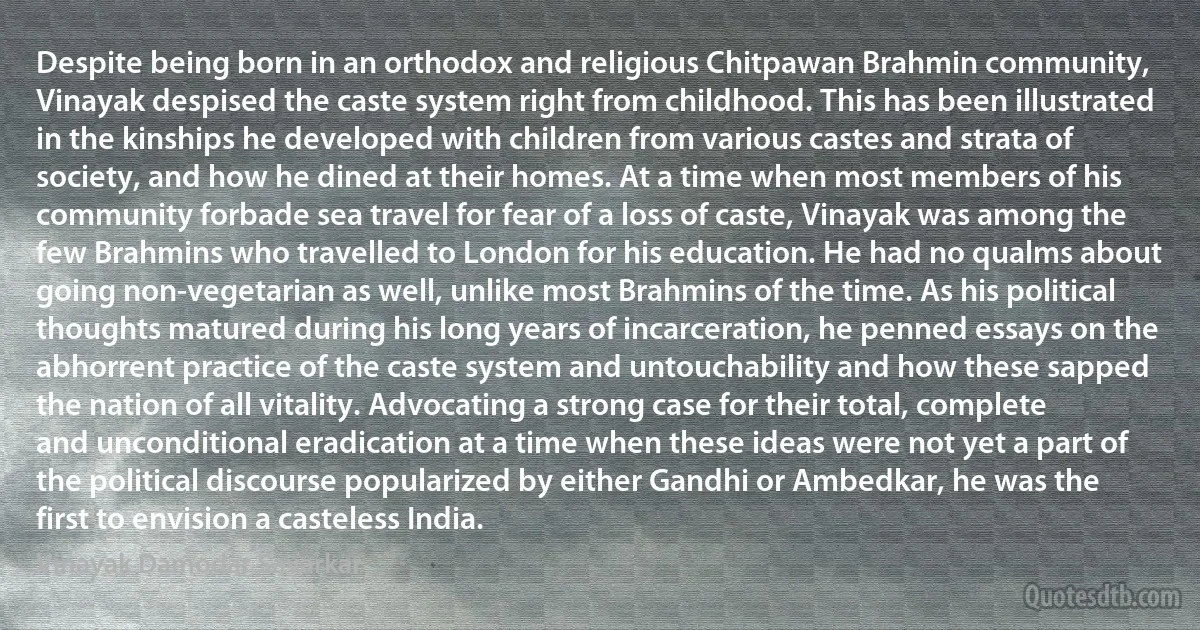
Despite being born in an orthodox and religious Chitpawan Brahmin community, Vinayak despised the caste system right from childhood. This has been illustrated in the kinships he developed with children from various castes and strata of society, and how he dined at their homes. At a time when most members of his community forbade sea travel for fear of a loss of caste, Vinayak was among the few Brahmins who travelled to London for his education. He had no qualms about going non-vegetarian as well, unlike most Brahmins of the time. As his political thoughts matured during his long years of incarceration, he penned essays on the abhorrent practice of the caste system and untouchability and how these sapped the nation of all vitality. Advocating a strong case for their total, complete and unconditional eradication at a time when these ideas were not yet a part of the political discourse popularized by either Gandhi or Ambedkar, he was the first to envision a casteless India.
Vinayak Damodar SavarkarRelated topics
born brahmin case children childhood education eradication fear few illustrated incarceration loss nation orthodox pen practice right sea strata time travel unconditional vitality well yet years gandhi homes untouchabilityRelated quotes
As is often the case with major disputes in economics, the argument over fiscal policy went on for years, with some critics of fiscal policy still defending their position when this book went to press. It seems fair, however, to say that among economists a more or less Keynesian view of the effects of fiscal policy came to prevail. Careful statistical studies at the International Monetary Fund and else where showed that austerity policies have historically been followed by contraction, not expansion. Recent experience, in which countries like Spain and Greece that were forced into severe austerity also experienced severe slumps, seemed to confirm that observation. Furthermore, it was clear that those who had predicted a sharp rise in U. S. interest rates due to budget deficits, leading to conventional crowding out, had been wrong: U. S. long-term interest rates remained near record lows even during the years from 2009 to 2012, when the government ran very large deficits.

Paul Krugman
Our presence will serve as an incentive for al Qaeda to grow in numbers and motivate more suicide bombers. An indefinite presence, whether in Iraq, Afghanistan, or Pakistan, will continue to drain our financial resources, undermine our national defense, demoralize our military and exacerbate our financial crisis. All this will be welcomed by Osama Bin Laden, just as he planned it. It's actually more than he had hoped for. [...] The war in Afghanistan and Pakistan will be much bigger, unless the dollar follows the path of the dollar-based world financial system and collapses into runaway inflation. In this case, the laws of economics and the realities of history will prove superior to the madness of maintaining a world empire financed by scraps of paper. Our military prowess, backed by a nuclear arsenal, will not suffice in overcoming the tragedy of a currency crisis. Soviet nukes did not preserve its empire or the communist economy.

Ron Paul
Some of the strongest supporters of the war declare that we are a Christian nation, yet use their religious beliefs to justify the war. They claim it is our Christian duty to remake the Middle East and attack the Muslim infidels. Evidently I have been reading from a different Bible. I remember something about "Blessed are the peacemakers.” My beliefs aside, Christian teaching of nearly a thousand years reinforces the concept of "The Just war theory.” This Christian theory emphasizes six criteria needed to justify Christian participation in war... The war in Iraq fails to meet almost all of these requirements. This discrepancy has generated anger and division within the Christian community. Some are angry because the war is being fought out of Christian duty, yet does not have uniform support from all Christians. Others are angry because they see Christianity as a religion as peace and forgiveness, not war and annihilation of enemies.

Ron Paul
The economic policy issues that we debate today-trade policy, inflation, the proper role of government, the eradication of poverty, and the means of raising the rate of economic growth-have been discussed by economists for more than two centuries. Many of today's economic policies-both the good ones and the bad-are the result of the ideas of those past economists. And many of today's debates about economic policy can be understood only by those who have at least some familiarity with the ideas of earlier economists.
The giants of economic science during the past two hundred years have been men concerned with the critical policy issues of their time. They studied the working of the economy in order to advocate better economic policies. But despite their concern with policy, they were not polemicists or politicians but men who sought to persuade their contemporaries in government and in the broader public by analysis and evidence that would meet the standards of professional debate.

Martin Feldstein
Cesalpino, a celebrated botanist, conceived that fossil shells had been left on the land by the sea, and had concreted into stone during the consolidation the soil; and in the following year (1597), Simeone Majoli went still farther, and coinciding for the most part with views of Cesalpino, suggested that the shells and matter of the Veronese, and other districts, might have cast up, upon the land, by volcanic explosions, like those gave rise, in 1538, to Monte Nuovo, near Puzzuoli.- This hint was the first imperfect attempt to connect the position fossil shells with the agency of volcanoes, a system more fully developed by Hooke, [Antonio] Lazzaro Moro, Hutton, and other writers. Two years afterwards, Imperati advocated the animal origin of fossilized shells, yet admitted that stones could vegetate by force of 'an internal principle,' and, as evidence of this, he referred to the teeth of fish, and spines of echini found petrified.

Charles Lyell
